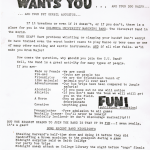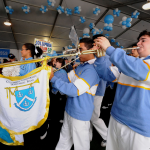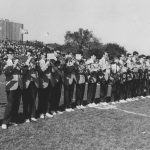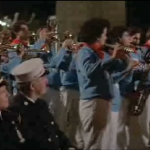Edwin Franko Goldman, 1920-1926
George C. Flint, 1926-1929
*Harwood Simmons ‘25CC ‘32MA, 1929-1946
Robert Ward, 1946-1948
Hunter N. Wiley, 1949-1959
Elias Dann ‘68PhD, 1959-1967
David Josephson ‘63CC, 1967-1970
Sheldon Henry, 1970-1971
Donald Barra, 1971-1973
Roger Nierenberg, 1973-1976
Joseph Greco, 1976-1978
*Rob Freeberg ‘78CC, 1979-1984
*Joe Klein ‘58CC, 1984-1986
* Band alum
1920-1926: In 1920, the University hired Edwin Franko Goldman (1878-1956), cornet soloist and New York’s most famous bandleader, the 20th century’s answer to John Philip Sousa, to be the Band’s first coach. Goldman turned the student group into a two-part aggregation: a marching unit that played to support Lion sports teams and a musically ambitious symphonic ensemble. During his tenure, he continued to lead his own famous Goldman Band and to compose works for band, including a march that became a long-running favorite of whistlers everywhere, one named for the stretch of Central Park he made famous: “On the Mall.”
1926-1929: George C. Flint (1870-1942) was chairing the music department at Boys’ High in Brooklyn and leading the amateur Brooklyn Symphonic Orchestra when he was tapped to coach the Columbia Band after Goldman’s departure. He must have been flattered, for he promptly wrote and published marches titled “King’s Crown” and “Columbia University Band.” Despite their alluring titles, neither has become part of America’s standard band repertoire.
1929-1946: After a quarter-century of being sort-of-serious about its band, the University in 1929 hired its first fulltime director, a Band alum just four years out of the College. He was Harwood Simmons ‘25CC ‘32MA (1902-1994). In short order, Simmons made the group one of the most publicized ensembles in New York, stars of stage, screen, radio, and football field. As time went on, Simmons also presided over the declining Band of the early 1940s, seriously weakened by a combination of World War II and administration neglect. After Columbia, he taught and led the band at Syracuse University for two decades more.
1946-1948: If World War II took its toll on the Band, the war also produced perhaps its most unlikely director, Robert Ward (1917-2013). Returning from conducting the 7th Infantry Band in the Pacific, Ward was already a prolific composer when he took a part-time gig at Columbia. He lasted just two years on the job, then turned to a Juilliard teaching career and, more and more, to composing opera. (His 1961 The Crucible, based on the Arthur Miller play, won a Pulitzer Prize.) Not long before he passed away at age 95, Ward warmly reminisced about his two autumns with the Marching Band. At the 1947 Yale game, he recalled, heavy rains drenched the Band’s U.S. Coast Guard surplus uniforms. “We had about 25 very soaked men on the field,” he said. “For the pre-game, the Yale Band formed the letters ‘HAIL COLUMBIA.’ We could barely manage to spell out ‘YALE.’”
1949-1959: Like Ward, Hunter N. Wiley (1919-2004) was a WWII veteran – in his case, Navy. He also was an internationally known euphonium soloist who appeared frequently with the New York Philharmonic, the New York City Ballet Orchestra, and others. Arriving at a Band low point, he helped rouse Columbia alumni and administrators into providing needed instruments, new uniforms, and, most important, a dedicated band room located comfortably – if inappropriately – in Low Library, beneath the rotunda. After a decade he left for the University of Tampa.
1959-1967: Elias Dann ‘68PhD (1916-2008) was yet another WWII vet to lead the Columbia Bands. A Juilliard-trained violinist (he also played tuba), he conducted musicals while in uniform and afterwards led the national tour of “Oklahoma!” to 100 North American cities. Shortly before he was to conduct the Concert Band in a new Aaron Copland work at Carnegie Hall, it was pointed out that the performance was not to be a world première, since the piece had been debuted two months earlier at an outdoor event in Arizona. Dann hesitated only a moment. “That’s OK,” he said. “We’ll have the indoor première.” After receiving his Columbia doctorate in musicology, he spent the rest of his career teaching at Florida State University, where he did not lead the band.
1979-1984: As a central figure in the Jazz Band and Wind Ensemble and drum major in the Marching Band, Rob Freeberg ’78CC practically lived in Ferris Booth Hall for a couple of his College years. Soon after graduation, he found himself at the helm of the Wind Ensemble, as the old Concert Band had started calling itself. He then made a career of teaching high school and leading bands of all sorts, mostly in and near Westchester, NY – big jazz bands, high school symphonic bands, pep bands – while doing freelance gigs as a trumpeter, arranger, and band leader. In 2012 he retired from daily teaching in New Rochelle and moved with his wife to southern Vermont to bike, hike, and ski. He hopes someday to get a dog to go with his pickup truck.
1984-1986: Joe Klein ‘58CC played euphonium in the Concert Band and sousaphone in the Marching Band and Pep Band, happily able to work the valves with his left hand and student-conduct with his right. He also was musical director of the Barnard Gilbert & Sullivan Society. After Columbia, he moved on to conduct Broadway musicals (more than 3,500 performances of Man of La Mancha alone) and spent 39 years as music director of Radio City Music Hall. He returned to campus to moonlight as Director of University Bands for a spell, and now teaches and coaches Columbia undergrads in voice and musical theater and advises student music groups when asked.




